The Bhagavad Gita is the ultimate book of knowledge and is duly recognized as such throughout the world. Its wisdom transcends the limits of time and space. I publish daily one message from the book which can be related to our daily life titled: Thought4TheDay
These are widely read and highly appreciated by my connections on LinkedIn, friends on Facebook and followers on twitter totally about 27000 people. As recommended by some friends, I am posting the same here. You may ask questions and/or post your comments which be appreciated. Hope you will find the initiative very rewarding.
Thought4TheDay (Nov. 5, 2017)
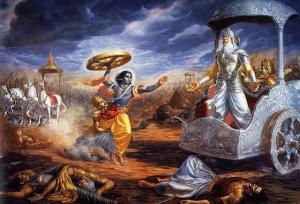 “The four orders of society (viz. the Brahmana, the Kshatriya, the Vaishya and the Shudra) were created by Me classifying them according to the mode of Prakriti predominant in each and assigning corresponding duties to them; yet the creator Me, the Almighty remain a non-doer.” This is how Krishna explained the order of the society to Arjuna.
“The four orders of society (viz. the Brahmana, the Kshatriya, the Vaishya and the Shudra) were created by Me classifying them according to the mode of Prakriti predominant in each and assigning corresponding duties to them; yet the creator Me, the Almighty remain a non-doer.” This is how Krishna explained the order of the society to Arjuna.
Indeed, the society needs all these four classes of people for proper functioning of the civil order. Unfortunately, over a period of time lower class/classes were looked down upon and our society was inflicted with the malady of untouchability. In fact, everything in this world keeps on changing. Any necessary principle when misdirected due to any reason can take form of an abominable disease, and so did this one in our country.
Noted British novelist named these four categories of people as Alpha, Beta, Gamma and Delta in his famous book, ‘The Brave New World’. In a bid to create an ideal society, humans are ‘manufactured’ in factories and conditioned as per requirement which again is shown as a curse to humanity.
We need to respect all human beings as they are, and that’s the message of The Bhagavad Gita.
Thought4TheDay (Nov. 4, 2017)
 While explaining the qualities of a stable minded person, Krishna emphasises one quality which, I think, has assumed more importance today than at any other time due to so many means of distractions and that is:
While explaining the qualities of a stable minded person, Krishna emphasises one quality which, I think, has assumed more importance today than at any other time due to so many means of distractions and that is:
‘Vayarth ki cheshta ka abhaav’ or no indulgence in futile efforts; that’s another extremely important lesson that we learn by the study of The Bhagavad Gita. The meaning or the significance of life and how to live it in the book of knowledge leaves no scope for engaging oneself into wasteful activities. We all know it well. We all realise it even better. Yet if we scrutinise any of our day, we may find that some of our time does get wasted with the avoidable and unnecessary activities. While it’s important to make a ‘to do’ list everyday, it is even more important to make ‘not to do’ a list also. And, everyday!
Read The Bhagavad Gita. Know the significance of your live. Be happy and spread happiness.
Please share this post with your friends for greater awareness, should you like it. Thanks.
The Bhagavad Gita Talks 29
The Bhagavad Gita is the ultimate book of knowledge and is duly recognized as such throughout the world. Its wisdom transcends the limits of time and space. I publish daily one message from the book which can be related to our daily life titled: Thought4TheDay
These are widely read and highly appreciated by my connections on LinkedIn, friends on Facebook and followers on twitter totally about 27000 people. As recommended by some friends, I am posting the same here. You may ask questions and/or post your comments which be appreciated. Hope you will find the initiative very rewarding.
Thought4TheDay (Nov. 3, 2017)
 We, humans suffer from many inherent fears. Our education and upbringing help us to conquer some, most or all these fears. But do they? Or at times, do they add to these fears? Unfounded as these could be, at times, we live with them throughout our lives. ‘Loag Kaya Kahen ge?’ The question prevents us from doing many things that we may.
We, humans suffer from many inherent fears. Our education and upbringing help us to conquer some, most or all these fears. But do they? Or at times, do they add to these fears? Unfounded as these could be, at times, we live with them throughout our lives. ‘Loag Kaya Kahen ge?’ The question prevents us from doing many things that we may.
These form the root cause of all negativity in our lives. Reading The Bhagavad Gita gives us one strong message. The message is that fear of criticism or failure should never deter us from performance of our duty.
At the battlefield, Arjuna tells Krishna that he would not fight and be responsible for the killing of his close relatives. But he also tells him that he does not know whether he would win or face a defeat. Uncertainty breeds fear of failure. Fear discourages any new enterprise. There is nothing worthwhile to achieve without any risk. Taking no risk is the biggest risk of life.
Thought 4TheDay (Nov. 2, 2017)
 It’s a myth that The Bhagavad Gita doesn’t encourage one to have goals. Unless you have specific, measurable and clear goals, how will you know what you must do at any particular time?
It’s a myth that The Bhagavad Gita doesn’t encourage one to have goals. Unless you have specific, measurable and clear goals, how will you know what you must do at any particular time?
Your goals determine the direction of your activities. These will help specifying your desired actions. Strategy to achieve your goals will enable you to make decisions about your actions. Movement towards your targets for achieving these goals is, in fact, journey of your life.
Your employer, or if you are a business owner, the needs of your business define your responsibilities. So also, your family friends and other connections. They all play their respective roles during the course of your journey.
Your conduct, interaction with others, hard work and ability to persevere cumulatively determine your rewards.
Please share this post with your friends for greater awareness, should you like it. Thanks.
The Bhagavad Gita Talks 28
The Bhagavad Gita is the ultimate book of knowledge and is duly recognized as such throughout the world. Its wisdom transcends the limits of time and space. I publish daily one message from the book which can be related to our daily life titled: Thought4TheDay
These are widely read and highly appreciated by my connections on LinkedIn, friends on Facebook and followers on twitter totally about 27000 people. As recommended by some friends, I am posting the same here. You may ask questions and/or post your comments which be appreciated. Hope you will find the initiative very rewarding.
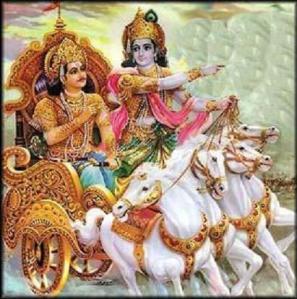
Thought4TheDay (Nov.1, 2017)
According to The Bhagavad Gita, nothing is more important in life than performing one’s duty wholeheartedly and to the best of your ability. But you cannot do this unless you keep an open mind. What does it mean? It means that you must assume nothing. No negative assumptions in any case. Your positive attitude will give you confidence of your success. But that too can fail. Yet, you need not get hurt, because that is life.
Your understanding of life’s various ways help you to have no expectations and yet do your best, always. As they say, excellence is a habit. Such are the habits of great thinkers, scientists and other seekers.
Thought4TheDay (30.10.2017)
The person who neither eats less,nor eats more; neither sleeps less, nor sleeps more; neither speaks less, nor speaks more; neither becomes too happy, nor becomes too sad; that person has understood how to live life. He has realised that day is followed by night which again is followed by day. The difference is that whereas day and night, summer and winter follow is a destined cycle, of an individual does not display a set cycle of events. They do change but they change in an irregular manner. Unexpected situations do arise and furthermore these may bring about totally unexpected results, sometimes weird. But that is life. And the wise truly understands this.
He, therefore, doesn’t gets attached to the results. Nevertheless, he keeps on performing his duty to the best of his ability.
Please share this post with your friends for greater awareness, should you like it. Thanks.
The Bhagavad Gita Talks 27
The Bhagavad Gita is the ultimate book of knowledge and is duly recognized as such throughout the world. Its wisdom transcends the limits of time and space. I publish daily one message from the book which can be related to our daily life titled: Thought4TheDay
These are widely read and highly appreciated by my connections on LinkedIn, friends on Facebook and followers on twitter totally about 27000 people. As recommended by some friends, I am posting the same here. You may ask questions and/or post your comments which be appreciated. Hope you will find the initiative very rewarding.
Thought4TheDay (29.10.2017)
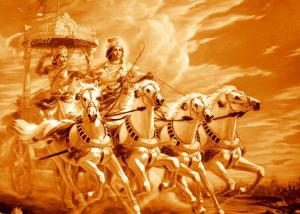 A person who closes all the doors of the senses, firmly holds his mind in his heart, and fixes his life-breath in his head becomes steadfast in his thoughts. This practice enables him to maintain concentration on God while performing his duties. Thus, when he leaves his body and departs repeating OM, the indestructible Brahma, reaches the supreme goal. He becomes a part of My absolute nature. Only such a person is able to do that who remains totally engaged in performance of his duty. He is not distracted by any worldly temptations. Self-awareness all the time and focus on ones’s duty enables one to follow this path of salvation. His achievements come to him as a result on his actions, his consistent efforts which enable him to persevere.
A person who closes all the doors of the senses, firmly holds his mind in his heart, and fixes his life-breath in his head becomes steadfast in his thoughts. This practice enables him to maintain concentration on God while performing his duties. Thus, when he leaves his body and departs repeating OM, the indestructible Brahma, reaches the supreme goal. He becomes a part of My absolute nature. Only such a person is able to do that who remains totally engaged in performance of his duty. He is not distracted by any worldly temptations. Self-awareness all the time and focus on ones’s duty enables one to follow this path of salvation. His achievements come to him as a result on his actions, his consistent efforts which enable him to persevere.
His self-esteem enables him to hold his head high without any kind of ego. He experiences peace. He lives life with all life’s ups and downs, happily.
Thought4TheDay (28.10.2017)
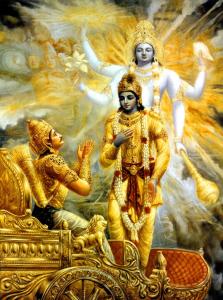 Almighty Krishna said, “The scientific understanding of the most significant secrets of life is the prime gift of knowledge. Besides, focus on science makes it easier to pursue the path of knowledge. It becomes easier remain on the right path and not loose track.”
Almighty Krishna said, “The scientific understanding of the most significant secrets of life is the prime gift of knowledge. Besides, focus on science makes it easier to pursue the path of knowledge. It becomes easier remain on the right path and not loose track.”
“According to religion, a person who is devoid of devotion for the creator of the universe cannot realise the vital truth. He cannot see My presence or realise Me. He keeps on wandering in this transient world. He remains in bewilderment.”
“The entire world is replete with My manifestations, just as ice with water. All living beings are present in Me but without following the principle of scientific understanding, it becomes difficult to realise.”
Please share this post with your friends for greater awareness, should you like it. Thanks.
The Bhagavad Gita Talks 26
The Bhagavad Gita is the ultimate book of knowledge and is duly recognized as such throughout the world. Its wisdom transcends the limits of time and space. I publish daily one message from the book which can be related to our daily life titled: Thought4TheDay
These are widely read and highly appreciated by my connections on LinkedIn, friends on Facebook and followers on twitter totally about 27000 people. As recommended by some friends, I am posting the same here. You may ask questions and/or post your comments which be appreciated. Hope you will find the initiative very rewarding.
Thought 4TheDay (27.10.2017)
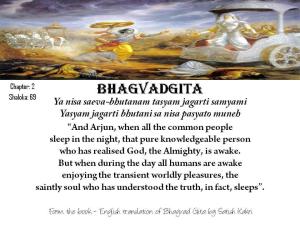
The world that we live in is, in fact, an illusion. This is transient. Whatever we do with intention of acquiring material objects do give some please, but it is momentary. Besides, it is likely to trigger a desire to secure more. The snowballing effect leads to the formation of greed which is the beginning of the end of peace and happiness.
But the wise with his understanding just acts as a witness to whatever happens. He doesn’t get emotionally involved, so his peace is never at stake.
Thought4TheDay (26.10.2017)

Bhagwan Shree Krishna said, ” For the person who is unable to control his mind, yoga is unachievable, but the person who has controlled his mind can surely progress towards becoming a yogi. He can do it with consistent efforts and constant practice. This is My considered opinion.”
Focus, concentration and discipline are great qualities an individual can, and should acquire. These will eradicate procrastination and distraction which are largely responsible for the wilderness of mind. When the mind is totally uncontrollable, it ultimately brings frustration. Mind can never be controlled by the procrastinators. Procrastination reduces the productivity of the victim disappointedly. Besides, it has a snowballing effect. Self esteem goes down and the person loses all respect for himself. A person who doesn’t respect himself cannot earn respect from others.
One must have specific goals. When we wholeheartedly work to achieve our goals, we start respecting ourselves. It gives us impetus to work harder. We make further progress. That strengthens our will power to persevere. Discipline is the natural outcome outcome of consistent hard work. Discipline enables us to make pursuit of excellence our habit.
Please share this post with your friends for greater awareness, should you like it. Thanks.
The Bhagavad Gita Talks 25
The Bhagavad Gita is the ultimate book of knowledge and is duly recognized as such throughout the world. Its wisdom transcends the limits of time and space. I publish daily one message from the book which can be related to our daily life titled: Thought4TheDay
These are widely read and highly appreciated by my connections on LinkedIn, friends on Facebook and followers on twitter totally about 27000 people. As recommended by some friends, I am posting the same here. You may ask questions and/or post your comments which be appreciated. Hope you will find the initiative very rewarding.
Thought4TheDay (25.10.2017)
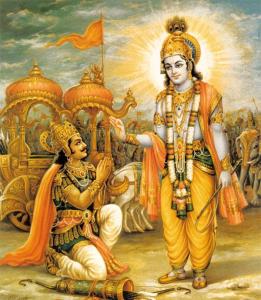
Lord Krishna said, ” The person whose emotions are fully controlled by wisdom and science, who has conquered his senses and for whom dust, stone or gold are all alike; it is said that such a seeker, a yogi has discovered his self. In other words, he has realised God.”
” He is the greatest among human beings. He is unselfish and interested in the good of everyone. He does not distinguish between a friend and a foe. He treats alike the virtuous and the sinners.”
Such a person will not have any prejudice against anyone. He will have an open mind and will listen to people to understand and not only to reply them. He follows the principle: first understand and then be understood. He does not take anything for granted. Like a devoted scientist, he keeps on studying the cause and effect. He treats acquiring knowledge and achieving wisdom as the ultimate goal of life. He can never be stressful. He is happy and always at peace with himself.
Thought4TheDay (24.10.2017)

“The person who does not brood over worldly pleasures; who shuts out all trivial thoughts; who fixes his gaze between the eyebrows of his forehead starts regulating his breath meditates with the objective of controlling his mind. He breaths in and out equally. Through meditation he is able to control his mind. He contemplates on My form, My being. He becomes free from all desires. He overpowers anger. All his fears vanish away. In fact, he achieves and experiences true freedom,” thus explained the Lord to Arjuna.
Meditation helps an individual to remain self aware at all times. He/she doesn’t loose track of direction. The life’s big picture, the significance and their goals keep such people motivated. Distractions of any kind do not disturb their vision. They remain wedded to the performance of their duty. Their positive attitude helps them to become stable minded. Truly, they pursue their noble goals and remaining satisfied with life, they happily go through the journey of this life.
Please share this post with your friends for greater awareness, should you like it. Thanks.
The Bhagavad Gita Talks 24
The Bhagavad Gita is the ultimate book of knowledge and is duly recognized as such throughout the world. Its wisdom transcends the limits of time and space. I publish daily one message from the book which can be related to our daily life titled: Thought4TheDay
These are widely read and highly appreciated by my connections on LinkedIn, friends on Facebook and followers on twitter totally about 27000 people. As recommended by some friends, I am posting the same here. You may ask questions and/or post your comments which be appreciated. Hope you will find the initiative very rewarding.
Thought4TheDay (23.10.2017)

The core message of The Bhagavad Gita is that everyone should perform his/her duty to the best of ability. The singular dictum can regulate the life of the human being if the meaning of duty is properly understood.
The first duty of the individual is to his own self. He/she must ensure and take all possible steps to maintain good mental and physical health. It is not being selfish or self-centred. It’s developing ability to work in the service of the Lord Almighty. One has to contribute to the progress and growth of humanity as these efforts as to be construed as the true worship.
The next duty of the individuals is to work and establish their loyalty to the employer if you are working for someone. But if you are an entrepreneur, it’s your duty to do your best for the wellbeing and progress of your enterprise and the people who man your establishment.
It’s your duty to look after your family, your parents, spouse and children. All your work need to conform to the needs of the nation, state and community to which you belong.
Thought4TheDay (22.10.2017)

Lord Krishna said, “Arjuna, whenever religion suffers a setback and sins excel, I assume the form of a living being and appear before mankind.”
“I appear from time to time, for the help and progress of the virtuous and deserving people, and for the destruction of the wicked and sinners. Objective is to safeguard religion and righteousness.”
“My birth and my deeds are divine, pure and transcendental. The person who understands and realises this truth does not take birth after death. Instead, he assumes My form and becomes a part of Me.” History testifies that the pendulum oscillates between the good and the evil. But there is no specific rhythm. Be a witness to whatever is happening around. Expect the unexpected and remain calm and composed. It’s possible when we perform our duty stretching ourselves and covering an extra mile for the growth and progress of humanity.
Please share this post with your friends for greater awareness, should you like it. Thanks.
The Bhagavad Gita Talks 23
The Bhagavad Gita is the ultimate book of knowledge and is duly recognized as such throughout the world. Its wisdom transcends the limits of time and space. I publish daily one message from the book which can be related to our daily life titled: Thought4TheDay
These are widely read and highly appreciated by my connections on LinkedIn, friends on Facebook and followers on twitter totally about 27000 people. As recommended by some friends, I am posting the same here. You may ask questions and/or post your comments which be appreciated. Hope you will find the initiative very rewarding.
Thought4TheDay (21.10.2017)
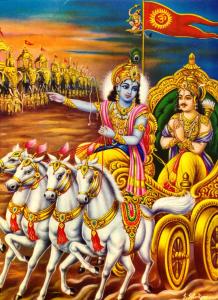 Lord Almighty said,”I am present in all living beings, with uniform existence. No one is dear to me more than anyone else, nor do I hate anyone. But those who worship Me with love and devotion; they reside in Me and I live in their hearts.”
Lord Almighty said,”I am present in all living beings, with uniform existence. No one is dear to me more than anyone else, nor do I hate anyone. But those who worship Me with love and devotion; they reside in Me and I live in their hearts.”
“Even if a dire sinner worships me sincerely, he is worthy of being known as a sage. I consider him as a decisive person, who has carefully realised that there is nothing as good as the worship of the Almighty.”
Again and again the Lord has repeated that He is present in everyone. So, what is the definition of worship? What does He mean when He says….”even if a dire sinner worships Almighty?” In fact, it is the realisation that working in the interest of humanity is the most significant devotion, one can offer. So, any endeavour dedicated to the service of humanity is nothing short of worship to the Lord Almighty. Surely, this message would give a direction to everyone about where to go and how to live?
Thought4TheDay(20.10.2017)
 Arjuna asks Lord Krishna, “What are the qualities of a person who becomes ‘sthirbudhi’ who is steady and resolute? How does he speak? How does he sit? How does he walk?”
Arjuna asks Lord Krishna, “What are the qualities of a person who becomes ‘sthirbudhi’ who is steady and resolute? How does he speak? How does he sit? How does he walk?”
Lord Krishna: “Arjuna, when a person renounces all his desires;when he finds peace and solace in his own soul and remains satisfied; he is known to have acquired ‘sthirbudhi’. He becomes steady and resolute.”
“When a person is not disturbed by the onslaught of sorrow; when he no longer keenly desires tempting pleasures and when he has conquered attachment, fear and anger, he is known to have secured ‘sthirbudhi’.”
In the highly competitive, fast paced and disruptive world today, one needs ‘sthirbudhi’ more than ever before to be at peace and maintain work life balance in life. Please comment, add and share with friends.
Please share this post with your friends for greater awareness, should you like it. Thanks.
The Bhagavad Gita Talks 22
The Bhagavad Gita is the ultimate book of knowledge and is duly recognized as such throughout the world. Its wisdom transcends the limits of time and space. I publish daily one message from the book which can be related to our daily life titled: Thought4TheDay
These are widely read and highly appreciated by my connections on LinkedIn, friends on Facebook and followers on twitter totally about 27000 people. As recommended by some friends, I am posting the same here. You may ask questions and/or post your comments which be appreciated. Hope you will find the initiative very rewarding.
Thought4TheDay (19.10.2019)
 Lord Krishna says to Arjuna, “The person who has conquered his self, his senses and his body, and has given up all objects of worldly pleasures; such a person, without his dependence on hopes of any kind, can carry out his normal duties and perform all his work utilising his body and senses and yet remain free from sin of any kind.”
Lord Krishna says to Arjuna, “The person who has conquered his self, his senses and his body, and has given up all objects of worldly pleasures; such a person, without his dependence on hopes of any kind, can carry out his normal duties and perform all his work utilising his body and senses and yet remain free from sin of any kind.”
He accepts with joy whatever he receives, because he is not bound by his desire nor hankers after worldly objects. The person who has freed himself of ego, envy or jealousy of any kind, and who transcends the effects of pleasure or pain, remains calm and composed in success or failure. Such a person remains free from attachment. He continues to perform his duty with joy.”
When we understand and contemplate on these words of Lord Almighty, we find the futility of attachment with the result of our efforts. It does not mean that our efforts are affected by the lack of interest. It only means that we put our mind and soul in performance of our duty, without our anxiety about the results. We achieve the best what is possible. That is progress. That is growth. And, that is the real prosperity.
Thought4TheDay (18.10.2017)
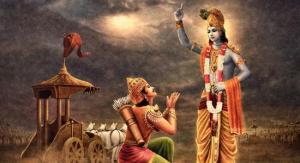 Lord Krishna says, ” Arjuna, the ignorant people do not understand My prime attribute and consider Me like other ordinary human beings. Even though I attain the human form and wander amongst worldly life, I do so only for the benefit of human society. Yet they inadvertently consider Me the Almighty, as any other common human being.”
Lord Krishna says, ” Arjuna, the ignorant people do not understand My prime attribute and consider Me like other ordinary human beings. Even though I attain the human form and wander amongst worldly life, I do so only for the benefit of human society. Yet they inadvertently consider Me the Almighty, as any other common human being.”
“These people are engaged in futile actions and nurture unproductive knowledge. In fact, these are the people who have limited intellect and assume ‘rakshasi’, ‘asuri’ or ‘ Mohini’ Prakriti’ (lower category of human character).”
“But Arjuna, the great souls assume ‘devi’ Prakriti (divine nature) and they understand Me as the endless cause of all living beings. They consider Me alone as the immortal and beyond destruction. They worship Me whole heartedly.”
It’s only when we realise the presence of Lord Almighty in all things and everywhere that we maintain the right path. We are not lost in bewilderment which abounds in this illusionary world. We realise our significance of life and we contribute to the progress and growth of human society.
Please share this post with your friends for greater awareness, should you like it. Thanks.
Good Writing Skills
Blogs constitute the first step in making of an author, today. There never was a time when so many aspirant authors were seen to find their space. Further, if your blogs become popular, the chances are strong that when you write a book the same will also be widely accepted. That will motivate you to write more and try to become author of a bestselling book. The popularity of eBooks may have hurt the traditional book business, but more books are being written than ever before.
But that is only one of the many advantages of writing blogs.
The more commonly in use is the benefit of improving your writing skills in general. It will improve your vocabulary, your sentence construction and remove problems of syntax. Clarity of expression also improves your credibility as well as your productivity.
I am reproducing a document which I found on the net. It is very inspiring. The title of the document is:
The Importance of Good Writing Skills in the Workplace
“Profession
Obviously good writing skills are important when your job involves writing, be it as a journalist, paralegal or public relations professional – that goes without saying. If you are employed for your writing skills, having “good” writing skills is a job requirement. However, more professions require good writing skills than those traditionally associated with writing. Any time a profession requires written communication, writing skills become important.
Communication
With emails, notes, letters, texts and Tweets, most people spend a fair amount of time at work communicating via the written word. Whether you are messaging a colleague, writing to your manager, or crafting the company newsletter, your writing skills can boost or hinder your career easily, even if you do not have a “writing” profession. Basically, writing skills make a difference in how you come across.
Credibility
People with good writing skills are generally seen as more credible. Think to yourself how you would interpret an email from a colleague that was filled with typos and grammatical errors. At best, he was negligent in that he didn’t proofread his message or use spell check; at worst, he comes across as less intelligent and less capable. Better writers tend to get higher grades and be perceived as more competent and more intelligent than their less literary counterparts.
Considerations
In the workplace, you need to make sure that you proofread everything you write, from an email to a company memo. However, just because good writing skills are a plus, you still need to pick your battles. Correcting others can work against you, in some cases even undermining you. Further, context and tone are just as important as grammar. While obvious mistakes are a no-no, such as using “their” and “they’re” incorrectly, smaller errors, like confusing “who” and “whom” are less important.
Importance of Good Business Writing Skills
Learning and honing business writing skills can have a positive impact on an individual’s career advancement. Effective channels of communication make an organization run smoothly. Professional quality writing being sent through these channels improves productivity and the ability of all functional areas to work together, particularly in an increasingly global workplace where collaboration is the norm.
Persuasion
Sales and marketing professionals are particularly skilled at using the written word to persuade customers to purchase the company’s products and services–or at least pay attention to its advertisements. But everyone in the business world finds it necessary at times to persuade someone else to take an action based on written material they have sent. The chief financial officer of a company makes written recommendations to the chief executive officer about expenditures. Human Resources tries to make a written case for hiring a particular individual to the manager to whom the person will report.
Clarity
Clarity in writing is one of the most difficult skills to master. Word choice comes more easily for some businesspeople than for others. Venture capitalists sometimes receive business plans that are so unclear it is difficult for them to tell what business the company is in. Presumably, expressing it clearly on paper proved too difficult for them.
Professional Courtesy
In this age of text messaging, business communication increasingly comes in a shorthand fashion. Even email has a much less formal style in many companies than a letter. Taken to an extreme, this type of writing can seem lazy. If communication becomes too abrupt, it can send a message that the person receiving the message was not important enough for the sender to take the time to communicate in complete sentences or check spelling and grammar. Conversely, a carefully written email can be more impressive than a letter because it has the added element of rapid transmission–the other person was so important that the sender wanted to make sure the message arrived quickly.
Completeness
Business communication can be ineffective if a document does not completely express its intention. An instruction manual on how to operate machinery, for example, must not have gaps in the sequence of steps or the how-to explanations. The result of incomplete information could be failure to run the machine properly or even cause injury to the equipment operator. A financial report that has the quality of completeness would be one that answers the reader’s questions before he has time to ask them.
Inspiring Confidence
Supervisors and business associates who express themselves well in writing inspire a feeling of confidence in their abilities from employees or colleagues. Sharp writing conveys the impression that a sharp mind composed the words. Sloppy writing, on the other hand, can make others conclude that the creator is not intelligent. Some might even question their job-related competence.
Team Building
Written communication to employees is one way a company shows that it values their contribution and appreciates their efforts. Subtle but strong bonds of teamwork can be built through simple means such as sharing company-wide accomplishments — sales milestones, for example — with everyone in the organization. The tone of the communication is particularly important. If it is energetic and positive, the employees will respond to it in an equally positive fashion.”
Hope you find it very useful for not only writing blogs but also for enhancing your expression in general.
Thanks for reading.